Process Controls & Load Cell Amplifiers for Weighing Systems
A load cell amplifier is essential as it makes the signals strong enough to be accurately read and processed by digital systems, ensuring that weight measurements are precise and reliable.
They also often convert analog signals from load cells into digital formats, facilitating seamless integration with modern digital control systems.
This simplifies the automation of processes and enhances the accuracy and stability of weight measurements across various industrial applications.
Here you will find a wide range of 0-10V and 4-20mA amplifiers, receivers and controls provide a ready solution to your PLC controlled batching process.
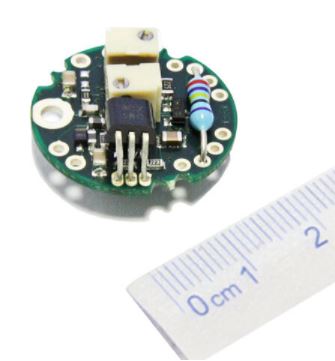
ICA4H 4-20MA INTERNAL LOAD CELL AMPLIFIER
Mantracourt ICA range of internal load cell amplifiers provide 4-20mA, 0-10V, 0-5V, +/-10V output to meet a wide range of PLC applications. Powered by 7.5-28V DC, depending on model . The ICA4H is a 3-wire 4-20mA amplifier.
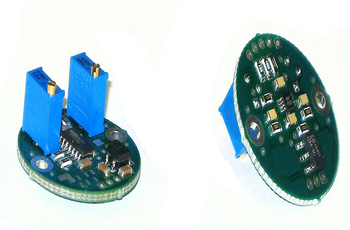
ML-4-20MA INTERNAL LOAD CELL AMPLIFIER
Massload internal load cell 2-wire 4-20mA amplifier is a reliable and cost effective solution suitable for most standard load cell to PLC applications. Powered by 9-30V DC.
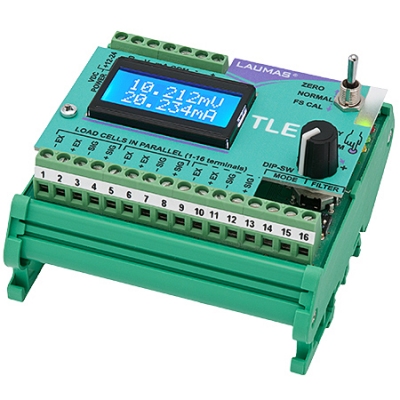
TLE 4-20MA ANALOGUE LOAD CELL WEIGHT TRANSMITTER
Laumas TLE is a high quality DIN rail mounted amplifier for up to 4 load cell inputs with 0-20mA, 4-20mA, 0-10V, 0-5V, +/-10V, +/- 5V outputs for PLC applications. Comes with 8-digit two line backlit alphanumeric LCD display and powered by 12-24VDC.
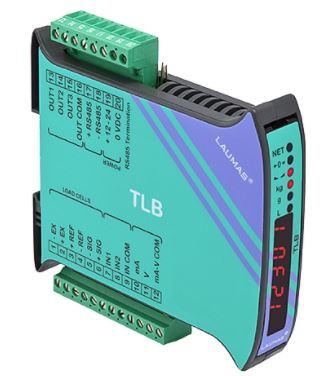
TLB DIN RAIL OIML 4-20MA ANALOGUE LOAD CELL WEIGHT TRANSMITTER
Laumas TLB and TLB4 is a high quality DIN rail mounted and OIML approved amplifier with 4-20mA, 0-10V, 0-5V, +/-10V, +/- 5V outputs for legal-for-trade PLC applications. 6-digit red LED display, 3 output relays and single and 4-channel configurations provide for excellent adaptability.
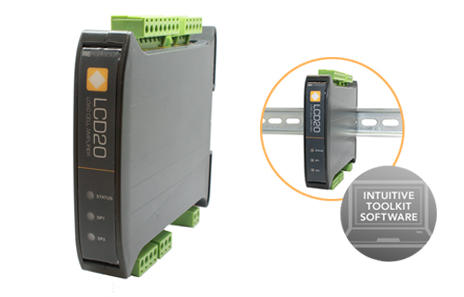
LCD20 DIN RAIL 4-20MA LOAD CELL AMPLIFIER
Mantracourt LCD20 is a high quality DIN rail mounted load cell amplifier with 4-20mA and 0-10V output for typical PLC connections. 10 point linearization and 2 relay outputs provides for extreme system accuracy and adaptability
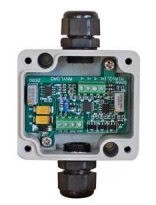
A1A-22 LOAD CELL AMPLIFIER
Anyload A1A-22 3-wire load cell amplifier provides 4-20mA and 0-10V suitable for most standard load cell to PLC applications. Powered by 24V+/-10% DC.
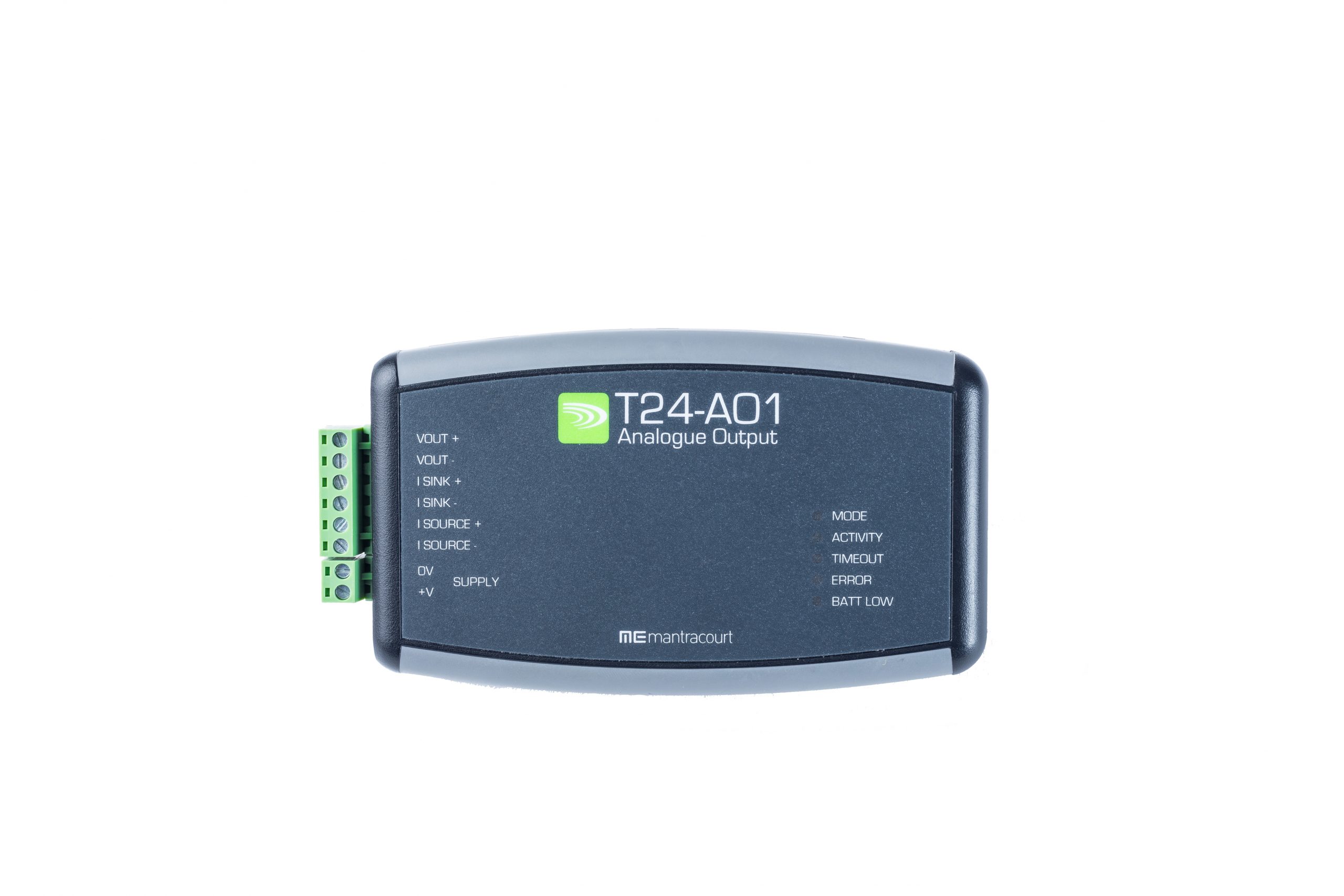
WL-T24-AO1 WIRELESS 4-20MA OUTPUT FOR PLC
Mantracourt T24-AO1 wireless receiver with analogue output connects with the T24-ACM wireless load cell transmiter to provide 0-20mA, 4-20mA, 0-10V, 0-5V, +/-10V +/-5V output options to the PLC controller.
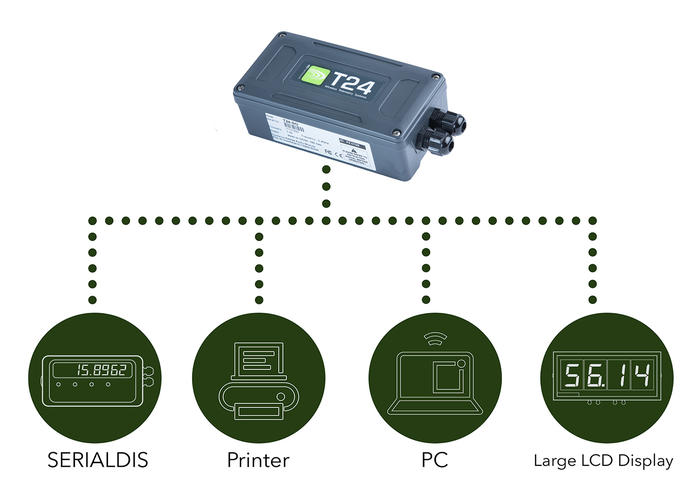
WL-T24-SO WIRELESS LOAD CELL SERIAL OUTPUT GATEWAY
Mantracourt T24-SO wireless receiver provides serial ASCII output to serial display, printer, PC and LCD displays.
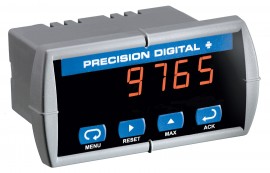
PD765-6R0 4-20mA Process Digital Panel Meter
Precision Digital PD765-6R0 process digital panel meter directly connects to load cell 4-20mA outputs for industrial process display.
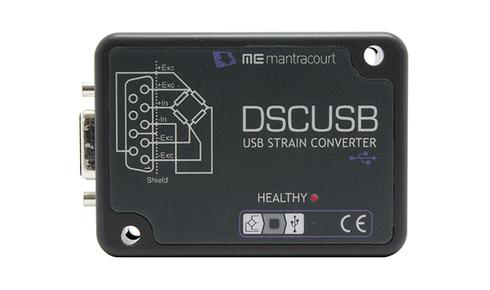
DSC LOAD CELL USB INTERFACE
Mantracourt DSCUSB digitises the load cell analogue output and provides a 200 sample per second data stream via the plug and play USB interface, while the DSC 24Channel Logging software provide easy-to-use load cell data capture and logging.
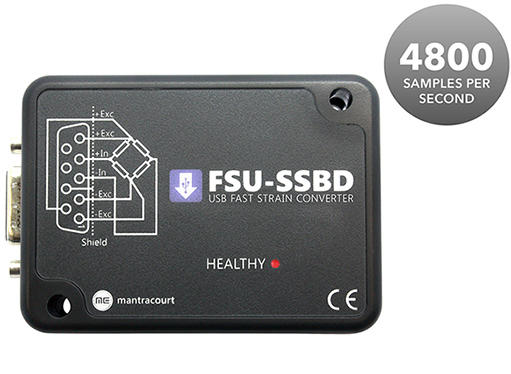
FSU-SSB HIGH SPEED LOAD CELL USB INTERFACE
Mantracourt FSU-SSB provides high speed sampling of the load cell analogue output with a 4800 samples per second data stream via the plug and play USB 32bit interface, while FSU toolkit software supports data capture and analysis.
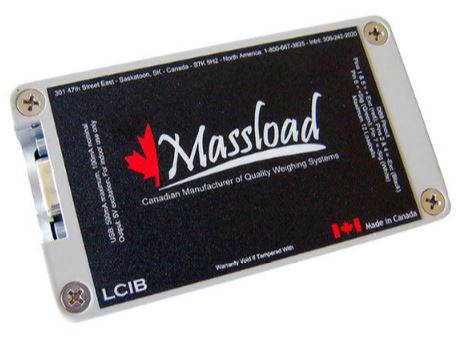
LCIB LOAD CELL USB INTERFACE
Massload's LCIB offers high speed sampling of the load cell analogue output with a 2000 samples per second data stream via the plug and play USB 32bit interface, while the the Scale Scope software supports data capture and analysis.
What Does a Load Cell Amplifier Do?
A load cell amplifier serves several key functions:
- Signal Enhancement: It amplifies the weak signals from the load cells to levels suitable for processing.
- Noise Reduction: By increasing the signal strength, the signal-to-noise ratio also increases, thereby enhancing the quality and accuracy of the signal.
- Data Integration: They enable integration with digital systems by converting analog signals into digital data.
These devices ensure that even the smallest weight variations are accurately captured and processed in environments like manufacturing plants or outdoor agricultural facilities.
Can You Use a Load Cell Without an Amplifier?
While load cells can operate without amplifiers, doing so often leads to suboptimal performance:
- Limited Signal Strength: In situations with a lot of electrical noise, such as industrial environments with electrical motors, amplifiers are essential for strengthening the signal and ensuring accuracy.
- Increased Error Margin: The likelihood of errors increases, compromising data reliability.
The Critical Role of Load Cell Amplifiers in Weighing Systems
Load cell amplifiers ensure that weight measurements are precise and robust enough to meet the stringent requirements of various industrial sectors.
The most important amplifier is the 4-20mA amplifier, which not only amplifies the signal but also converts it from voltage to current, rendering it largely immune to electrical noise.
Here’s how load cell amplifiers contribute to industrial weighing:
- Signal Amplification: Load cells generate small electrical signals in response to weight changes.
These signals are often too weak to accurately read by display or control systems. Load cell amplifiers boost these weak signals to a higher, more manageable voltage level, ensuring that electronic equipment can accurately and reliably read and process them. - Noise Reduction: Industrial environments are typically filled with electronic noise, which can interfere with the weak signals produced by load cells.
- Signal Conversion: Many load cell amplifiers also serve as signal conditioners, converting the analog signals from load cells into digital outputs that can be directly utilized by digital control systems and computers.
- Improved Accuracy and Stability: By amplifying and conditioning the signals from load cells, amplifiers ensure that the readings are stable and accurate, even with fluctuations in temperature and other environmental conditions that could affect measurement accuracy.
- Versatility and Integration: Load cell amplifiers can be configured to work with various load cell types and capacities, making them versatile components in industrial weighing systems.
Industries Relying on Load Cell Amplifiers
Various sectors depend on robust weighing systems:
- Manufacturing: For monitoring inventory and ensuring product specifications are met.
- Agriculture: Used in feed mixing and distribution systems to ensure proper ratios.
- Mining: Load cell amplifiers are used in mining to monitor and control the weight of materials extracted and processed.
- Oil and Gas: This industry relies on precise measurements for drilling and production processes, where load cell amplifiers help ensure the correct handling and distribution of fluids and gases under high-pressure conditions.
- Construction: In construction, accurate weighing is vital for material specifications and load-bearing calculations.
- Aerospace: Crucial for balancing and fuel measurements.
- Lifting and Hoisting: Load cell amplifiers are integral in lifting and hoisting operations, providing real-time load monitoring to prevent overloading and ensure safety during the movement of heavy materials and equipment.
- Automotive: Essential in testing and quality assurance processes.
How Do You Choose the Best Load Cell Amplifier for Your Weight Application?
Choosing the best load cell amplifier for your weighing application involves several key considerations to ensure accuracy, reliability, and compatibility with your existing systems.
Here’s a step-by-step guide to help you make the right choice:
- Understand Your Application Requirements: Begin by defining your application’s specific needs.
Consider the environment in which the amplifier will operate, the range of weights it needs to measure, and any specific industry standards or regulations that must be met.
For example, applications in hazardous areas might require amplifiers with specific safety certifications. - Determine Compatibility with Load Cells: Ensure that the amplifier is compatible with your load cells.
This includes checking the input and output signal types, voltage requirements, and connection interfaces. The amplifier should match the specifications of your load cells to optimize performance and accuracy. - Evaluate Performance Specifications: Look at the performance specifications of different amplifiers.
Key factors include accuracy, linearity, temperature stability, and signal noise. Higher accuracy and lower noise are crucial for precise measurements, while temperature stability is important in environments with fluctuating conditions. - Consider Additional Features: Some amplifiers offer additional features that may benefit your application, such as digital outputs, wireless connectivity, or built-in data logging capabilities.
Decide if these features will add value to your system by enhancing convenience, data management, or integration with other industrial control systems. - Assess the Operating Environment: The physical and environmental conditions where the amplifier will be installed play a critical role in your selection.
For rugged or outdoor environments, choose amplifiers with appropriate protective casings and environmental ratings (e.g., IP rating for dust and water resistance). - Check for Calibration and Configuration Options: It’s important that the amplifier can be easily calibrated and configured according to your needs.
Some amplifiers have user-friendly interfaces and software that simplify setup and maintenance. - Review Support and Warranty: Consider the manufacturer’s support and warranty services. Reliable customer support can be invaluable for troubleshooting and maintenance, while a good warranty will protect your investment in case of faults or failures.
Why Massload Technologies Stands Out?
Our amplifiers are designed with the latest technology to ensure superior performance in various industrial conditions:
- In house calibration: Precise calibration of load cells with amplifiers, such as the 4-20mA type commonly used for PLC applications.
- High-Quality Manufacturing: Our products are built to offer longevity and reliability.
- Expertise and Experience: With years of industry presence, we understand the intricacies of weight measurement in diverse fields.
- Customer Satisfaction: We prioritize support and service, ensuring our clients have the best experience with our products.
Massload Internal Load Cell 2-Wire 4–20mA Amplifier
The Massload internal load cell amplifier with a 4-20mA output is an efficient and economical choice for integrating standard load cells into PLC systems.
Operating on a flexible 9-30V DC power supply, this 2-wire amplifier is designed to deliver reliable performance in various standard load cell applications.
Key Features:
- Internal 4-20mA Load Cell Amplifier: Optimized for seamless integration with PLC applications.
- Cost-Effective and Reliable: Provides a dependable solution without sacrificing quality.
- Universal Compatibility: Compatible with most standard load cells, ensuring broad application use.
- Flexible Power Requirements: Supports a wide power supply range from 9-30V DC, accommodating diverse operational setups.
Who Makes the Best Load Cells Amplifiers?
It would be easy to answer us, but we believe in doing the best for our clients overall, so our answer depends on your application.
We can assure you that we can help you figure out what kind of load cell amplifier this will be.
Contact Massload Technologies for a consultation to discuss our reliable load cell amplifiers. We are always available to help you make the smart choice.


